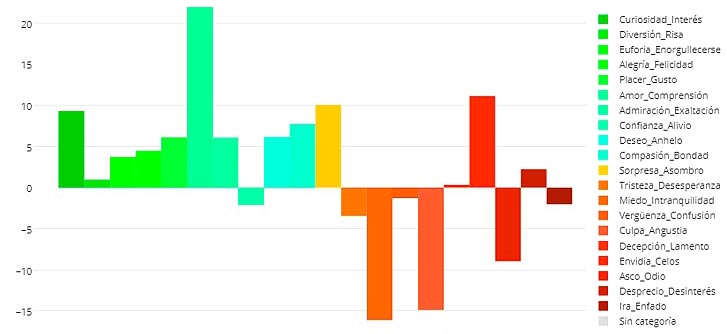
Lynguo automatically extracts a sentiment analysis from the opinion, emotion or attitude that is inferred from a given text in order to obtain value from the multiple opinions, criticisms and assessments that users spontaneously make about a brand or competition.
How do we analyse sentiment?
Sentiment analysis uses the Natural Language Processing to ascertain the opinion of a message on social networks, that is, whether it is positive, negative or neutral. The Lynguo tool performs an analysis at different levels to ensure a greater degree of accuracy than other NLP engines:
Lexical level
Syntactic level
Semantic level
Level of relationship between concepts or context
Sentiment Analysis will help you to identify opportunities or anticipate and solve possible reputational crises.
Lynguo’s customized engine distinguishes sentiment within context and theme.
The Lynguo engine, with customization capability, provides an even higher level of accuracy. While generic engines that perform sentiment analysis offer only tags with the opinion of the comment (positive, negative or neutral), the Lynguo engine is customized according to the context and theme of each sector, providing more value and knowledge.
Lynguo distinguishes sentiment within context and theme. In this example, the context is the automotive industry, while the themes are power and price. ‘Power’ is related to a negative sentiment (‘low’) and ‘price’ with a positive sentiment (‘very affordable’).
The car is low power but the price is very affordable.
Analysis of emotions
It automatically detects the emotions of user comments on social networks, from love and joy to sadness and anger.
This analysis of data is very useful for companies, for example, to know how users respond to brands: detecting anger or satisfaction of customers telephoning Call Centres, how consumers value products, if they are happy or unhappy with their purchase, etc.
Analysis by category
Discover the sentiment of users regarding a specific feature (pricing, technical service, after-sales service, usability, advertising, branding …) for each of the brands monitored.
Analysis by category provides a very clear vision of how a product, service or brand is positioned, and is very effective in projects of brand reputation or user engagement, helping brands to direct their messages or marketing campaigns in order to improve the image it is transmitting.
In the example we can see that the strength of Brand 1 is its Image. It has no negative opinions and the Image category is very positive. On the other hand, Brand 3 is strong in Product, but it must improve its strategy in the Service and Image categories.
Lynguo automatically extracts a sentiment analysis from the opinion, emotion or attitude.


